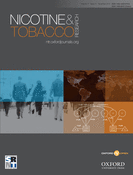-
Views
-
Cite
Cite
Anna García-Altés, Jaime Pinilla, Marc Marí-Dell’Olmo, Esteve Fernández, Maria José López, Economic Impact of Smoke-Free Legislation: Did the Spanish Tobacco Control Law Affect the Economic Activity of Bars and Restaurants?, Nicotine & Tobacco Research, Volume 17, Issue 11, November 2015, Pages 1397–1400, https://doi.org/10.1093/ntr/ntu346
Close - Share Icon Share
Abstract
The potential of smoke-free bans to negatively impact the hospitality business has been an argument of the hospitality and tobacco industry against such legislation. A partial smoke-free legislation was introduced in Spain in 2006 allowing smoking in most bars and restaurants due to the pressure of the hospitality sector. However, this partial ban was later amended in 2011 to include all the hospitality premises without exceptions. The stepped Spanish process permits to evaluate whether the entry into force of the smoke-free legislation had any effect on the economic activity of the hospitality sector.
We employed a pooled time series cross-sectional design, with national data over 6 years (2006–2011). The dependent variable used was the total number of bars and restaurants per 100,000 inhabitants. The explanatory variables used were the average amount of spending per household in bars and restaurants, and the total unemployment rate in Spain by regions.
For every 1% increase in the unemployment rate there was a 0.05% decrease in the number of bars and restaurants. In 2007, the number of bars and restaurants was significantly reduced by 13.06% (all others factors being held constant), 4.87% in 2008, and 10.42% in 2009. No statistically significant effect of the smoke-free legislation emerged from 2010 (6.76%) to 2011 (7.69%).
The new Spanish smoke-free legislation had no effect on the number of bars and restaurants.






Comments